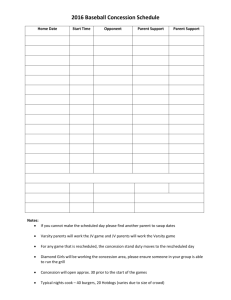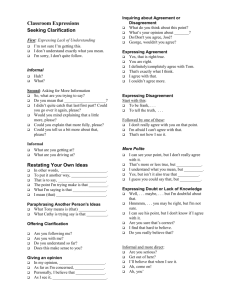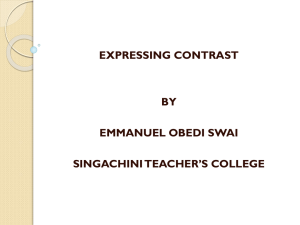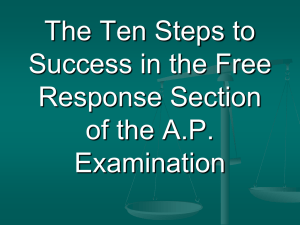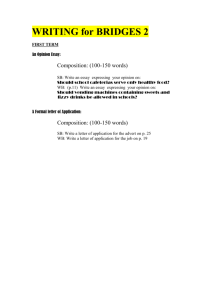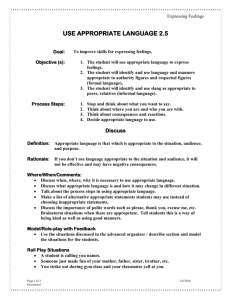Study Notes
advertisement
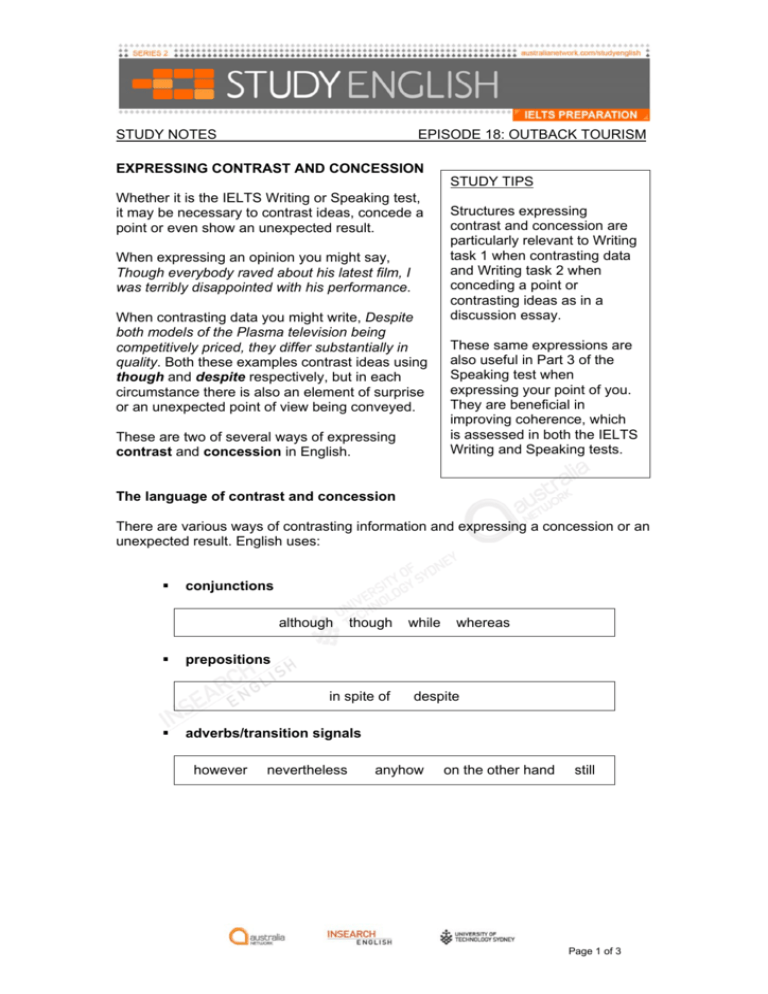
STUDY NOTES EPISODE 18: OUTBACK TOURISM EXPRESSING CONTRAST AND CONCESSION STUDY TIPS Whether it is the IELTS Writing or Speaking test, it may be necessary to contrast ideas, concede a point or even show an unexpected result. When expressing an opinion you might say, Though everybody raved about his latest film, I was terribly disappointed with his performance. When contrasting data you might write, Despite both models of the Plasma television being competitively priced, they differ substantially in quality. Both these examples contrast ideas using though and despite respectively, but in each circumstance there is also an element of surprise or an unexpected point of view being conveyed. These are two of several ways of expressing contrast and concession in English. Structures expressing contrast and concession are particularly relevant to Writing task 1 when contrasting data and Writing task 2 when conceding a point or contrasting ideas as in a discussion essay. These same expressions are also useful in Part 3 of the Speaking test when expressing your point of you. They are beneficial in improving coherence, which is assessed in both the IELTS Writing and Speaking tests. The language of contrast and concession There are various ways of contrasting information and expressing a concession or an unexpected result. English uses: conjunctions although though while whereas prepositions in spite of despite adverbs/transition signals however nevertheless anyhow on the other hand still Page 1 of 3 Structure of contrast and concession sentences The two example sentences below are used to construct sentences to express contrast and concession, using a conjunction, preposition and adverb/transition signal. Example sentences The fires decimated hectares of bush land. There was a minimal loss of wildlife. Conjunction – although + subject + verb Although the fires decimated hectares of bush land, there was a minimal loss of wildlife. Preposition – despite + noun eg. despite + pronoun (this, that, what etc.) despite + -ing form Despite the decimation of bush land, there was a minimal loss of wildlife. Despite that, there was a minimal loss of wildlife. Despite decimating hectares of bush land, there was a minimal loss of wildlife. Adverb/transition signal – however The fires decimated hectares of bush land. However, there was a minimal loss of wildlife. Summary of grammatical forms expressing contrast and concession The table below summarises the uses of the three grammatical forms for expressing contrast and concession. Conjunctions although though (informal) Meaning expressing a contrast or a difference even though while whereas (formal) whilst (very formal) Notes subject + verb follow the conjunction a clause starting with a conjunction can be put either before or after the main clause clauses with a conjunction are separated with a comma Examples: Although Sydney is the biggest city in Australia, it isn’t the capital. While I’m studying structural engineering, my sister is working in the IT industry. The first study examined the causes of stress, whereas the second provided solutions. Page 2 of 3 Conjunctions continued although though (informal) Meaning even though while whereas (formal) whilst (very formal) Notes expressing opposition or an unexpected result in these circumstances one idea opposes the idea in the other clause, which usually expresses an unexpected result Examples: Although the hurricane left a devastating trail of destruction, there were few casualties. While the drugs were tested extensively before being released, no one could have predicted the terrible side effects. Prepositions in spite of in spite of the fact that Meaning expressing a contrast or a difference; expressing an unexpected result (concession) despite despite the fact that notwithstanding (very formal) Notes these prepositions are followed by a noun, pronoun (this/that/what, etc) or –ing form they cannot be used before a finite clause, eg. despite it is the cold weather though they carry the same meaning as although and though, these structures are more formal when introducing a clause with these prepositions, then the fact that needs to be added not that despite is written without ‘of’ compared with in spite of Examples: Despite having a highly responsible job, John’s salary was not commensurate with the position. In spite of the fact that more police are patrolling the streets, the crime rate continues to climb. Despite their religious differences, Jill and Michael get along splendidly. Notwithstanding her fame, Margaret remained very humble. Adverbs/transition signals however (formal) nevertheless (very formal) nonetheless (very formal) anyhow (informal) anyway (informal) in any case (informal) on the other hand (formal) on the contrary (formal) still (informal) all the same (informal) mind you (informal) Meaning expressing a contrast or a difference; expressing an unexpected result (concession) Notes commas are used to separate these words and phrases from the sentence or within a sentence often used at the beginning of a sentence Examples: The new procedures, which have been implemented, are not problem-free. They have, however, improved the efficiency of the department. Petrol prices are rising at an alarming rate. Nonetheless, people are still driving their cars short distances. The tickets to the closing ceremony of the Olympics are really not within my price range. Still, it would be worthwhile going! Page 3 of 3

